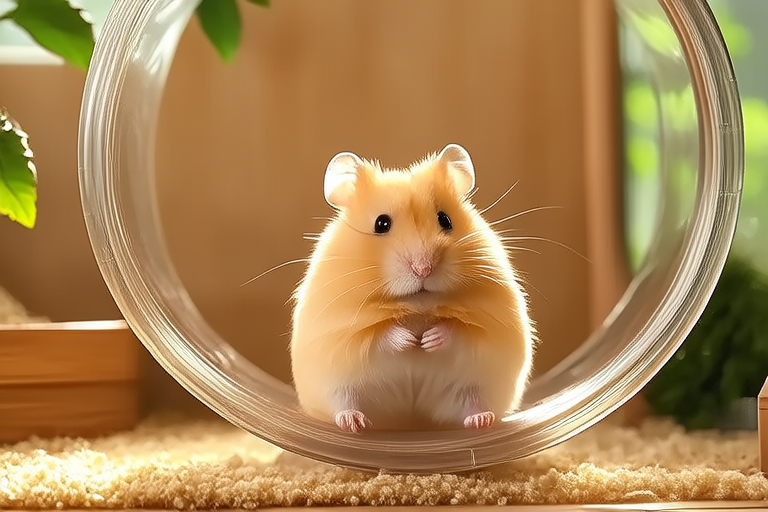Hamster Health Hacks: Easy Ways to Ensure Your Pet Stays Fit
Welcome to the world of hamsters! These tiny creatures are not only adorable but also full of energy and personality. As a hamster owner, it is your responsibility to ensure your pet stays healthy and happy. Maintaining your hamster’s health is crucial for their longevity and overall quality of life. A well-cared-for hamster can live up to three years, and by following some simple health hacks, you can help your furry friend reach this milestone. This article will guide you through the essential aspects of hamster care, from proper nutrition to regular health check-ups, ensuring your pet leads a vibrant and joyful life.
Proper Diet: Fueling Your Hamster’s Energy
Just like humans, hamsters need a balanced diet to thrive. Their diet should consist of high-quality commercial hamster food, fresh vegetables, fruits, and occasional treats. Commercial hamster food is specifically formulated to meet their nutritional needs and includes a mix of seeds, grains, and pellets. It’s important to choose a brand that doesn’t contain artificial colors or flavors.
Fresh vegetables such as carrots, broccoli, and leafy greens provide essential vitamins and minerals. Introduce new vegetables gradually to avoid digestive upset. Fruits like apples and berries can be offered as occasional treats due to their high sugar content. Remember, moderation is key when it comes to treats; too much fruit can lead to obesity and other health problems.
Provide clean water daily in a sipper bottle designed for small animals. Change the water regularly to prevent bacterial growth. Avoid giving your hamster salty, sugary, or fatty foods, as these can harm their delicate digestive systems.
Suitable Exercise Routines: Keeping Your Hamster Active
Exercise is vital for hamsters to maintain their physical health and mental stimulation. Hamsters are naturally active and enjoy exploring their environment. Providing them with toys and accessories can encourage physical activity and prevent boredom. Exercise wheels are a popular choice for hamsters; they allow your pet to run freely at night, which is when they are most active. Choose a solid-surface wheel to prevent injuries to their feet.
In addition to the exercise wheel, offer tunnels, chew toys, and other interactive items. Tunnels can be made from cardboard tubes or purchased commercially. Chew toys help wear down their constantly growing teeth and provide mental stimulation. Rotate toys periodically to keep things interesting for your hamster.
Supervise playtime if you introduce your hamster to other pets or children. While hamsters are social creatures, they can become stressed or aggressive if they feel threatened. Always handle your hamster gently and with care.
Habitat Maintenance: Creating a Clean and Comfortable Home
A clean and comfortable living space is essential for your hamster’s health. Regularly clean the cage to remove waste and prevent odors. Use a safe disinfectant to sanitize the cage and accessories. Avoid harsh chemicals that could be toxic to your pet. Replace bedding material frequently to maintain hygiene.
Ensure the cage is appropriately sized for your hamster’s breed. Syrian hamsters require more space than dwarf hamsters. The cage should have adequate ventilation and be escape-proof. Place the cage in a quiet area away from direct sunlight and drafts. Provide hiding spots and nesting areas with soft bedding materials like shredded paper or cotton. Avoid using pine or cedar shavings, as they can irritate your hamster’s respiratory system.
Regularly inspect the cage for any signs of damage or wear. Replace worn-out accessories promptly to prevent accidents. By maintaining a clean and safe environment, you can help your hamster stay healthy and happy.
Regular Health Check-Ups: Monitoring Your Hamster’s Wellbeing
Regular health check-ups are crucial for early detection of potential health issues. Monitor your hamster’s behavior, appetite, and appearance daily. Look for changes in activity levels, weight, and coat condition. If you notice any unusual symptoms, consult a veterinarian specializing in exotic pets.
Common signs of illness in hamsters include lethargy, loss of appetite, diarrhea, labored breathing, and discharge from the eyes or nose. Early intervention can make a significant difference in treating illnesses effectively. Regular check-ups can also help prevent health issues by addressing minor concerns before they escalate.
Preventive measures include maintaining a clean living environment, providing a balanced diet, and ensuring proper exercise. Vaccinations are not typically necessary for hamsters, but discuss specific recommendations with your veterinarian based on your pet’s individual needs.
Bonding Activities: Promoting Physical and Mental Well-being
Spending quality time with your hamster can strengthen your bond and promote their overall well-being. Handling your hamster gently and frequently can help them become accustomed to human interaction. Begin by offering treats to build trust. Once your hamster feels comfortable, you can gradually increase the duration and frequency of handling sessions.
Interactive playtime is another great way to bond with your hamster. Engage in activities such as hide-and-seek games or obstacle courses using tunnels and toys. These activities provide mental stimulation and promote physical activity. Always supervise playtime to ensure your hamster remains safe and enjoys the experience.
Creating a positive and enriching environment for your hamster can significantly enhance their quality of life. By incorporating these health hacks into your routine, you can help your furry friend stay fit, healthy, and happy. Remember, a well-cared-for hamster is a joy to have as a companion. Happy hamster parenting!
